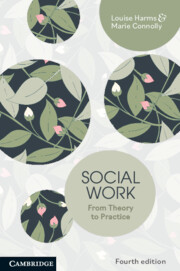Refine search
Actions for selected content:
36831 results in Cambridge Textbooks
7 - Story-telling theories
-
- Book:
- Social Work
- Published online:
- 27 July 2023
- Print publication:
- 28 July 2023, pp 142-162
-
- Chapter
- Export citation
Preface
-
- Book:
- Social Work
- Published online:
- 27 July 2023
- Print publication:
- 28 July 2023, pp xiii-xvii
-
- Chapter
- Export citation
6 - Faulty-engine theories
-
- Book:
- Social Work
- Published online:
- 27 July 2023
- Print publication:
- 28 July 2023, pp 119-141
-
- Chapter
- Export citation
About the authors
-
- Book:
- Social Work
- Published online:
- 27 July 2023
- Print publication:
- 28 July 2023, pp xii-xii
-
- Chapter
- Export citation
Index
-
- Book:
- Social Work
- Published online:
- 27 July 2023
- Print publication:
- 28 July 2023, pp 216-223
-
- Chapter
- Export citation
Figures and tables
-
- Book:
- Social Work
- Published online:
- 27 July 2023
- Print publication:
- 28 July 2023, pp xi-xi
-
- Chapter
- Export citation
Acknowledgements
-
- Book:
- Social Work
- Published online:
- 27 July 2023
- Print publication:
- 28 July 2023, pp xviii-xx
-
- Chapter
- Export citation
5 - Onion-peeling theories
-
- Book:
- Social Work
- Published online:
- 27 July 2023
- Print publication:
- 28 July 2023, pp 92-118
-
- Chapter
- Export citation
Concluding thoughts
-
- Book:
- Social Work
- Published online:
- 27 July 2023
- Print publication:
- 28 July 2023, pp 198-199
-
- Chapter
- Export citation

Social Work
- From Theory to Practice
-
- Published online:
- 27 July 2023
- Print publication:
- 28 July 2023
-
- Textbook
- Export citation
Illustrations
-
- Book:
- Caesar: <i>Bellum Gallicum</i> Book VII
- Published online:
- 30 January 2024
- Print publication:
- 27 July 2023, pp ix-x
-
- Chapter
- Export citation
Index Locorum, Gentium Personarumque
-
- Book:
- Caesar: <i>Bellum Gallicum</i> Book VII
- Published online:
- 30 January 2024
- Print publication:
- 27 July 2023, pp 374-376
-
- Chapter
- Export citation
Contents
-
- Book:
- Caesar: <i>Bellum Gallicum</i> Book VII
- Published online:
- 30 January 2024
- Print publication:
- 27 July 2023, pp vii-viii
-
- Chapter
- Export citation
Works Cited
-
- Book:
- Caesar: <i>Bellum Gallicum</i> Book VII
- Published online:
- 30 January 2024
- Print publication:
- 27 July 2023, pp 345-373
-
- Chapter
- Export citation
Commentary
-
- Book:
- Caesar: <i>Bellum Gallicum</i> Book VII
- Published online:
- 30 January 2024
- Print publication:
- 27 July 2023, pp 115-344
-
- Chapter
- Export citation
Preface and Acknowledgments
-
- Book:
- Caesar: <i>Bellum Gallicum</i> Book VII
- Published online:
- 30 January 2024
- Print publication:
- 27 July 2023, pp xi-xiii
-
- Chapter
- Export citation
Abbreviations and References by Author’s Name Alone (Excluding Standard Commentaries)
-
- Book:
- Caesar: <i>Bellum Gallicum</i> Book VII
- Published online:
- 30 January 2024
- Print publication:
- 27 July 2023, pp xiv-xvi
-
- Chapter
- Export citation
Dedication
-
- Book:
- Caesar: <i>Bellum Gallicum</i> Book VII
- Published online:
- 30 January 2024
- Print publication:
- 27 July 2023, pp v-vi
-
- Chapter
- Export citation
Index
-
- Book:
- Caesar: <i>Bellum Gallicum</i> Book VII
- Published online:
- 30 January 2024
- Print publication:
- 27 July 2023, pp 377-386
-
- Chapter
- Export citation
Frontmatter
-
- Book:
- Caesar: <i>Bellum Gallicum</i> Book VII
- Published online:
- 30 January 2024
- Print publication:
- 27 July 2023, pp i-iv
-
- Chapter
- Export citation
